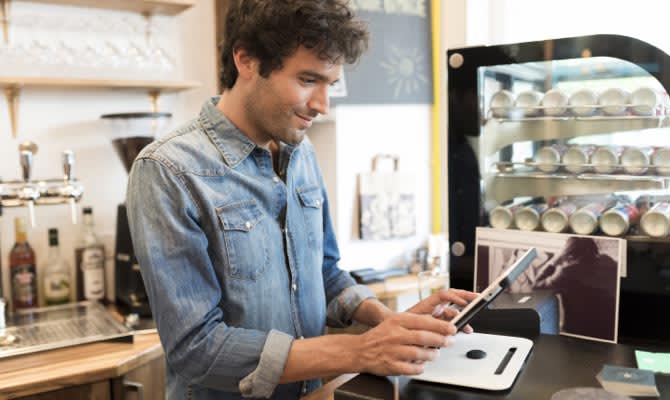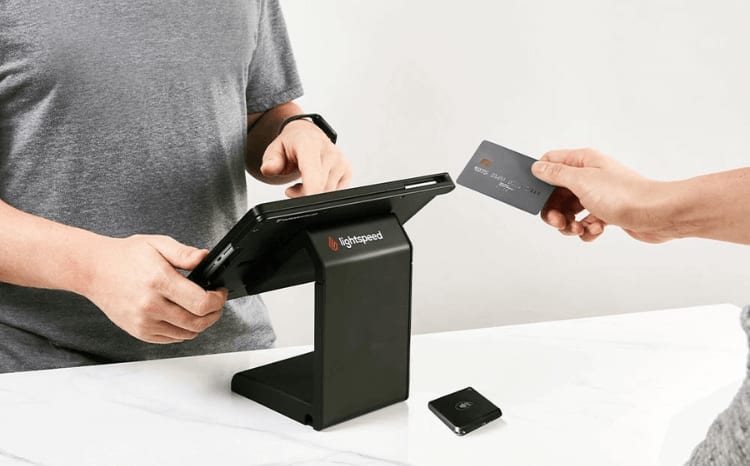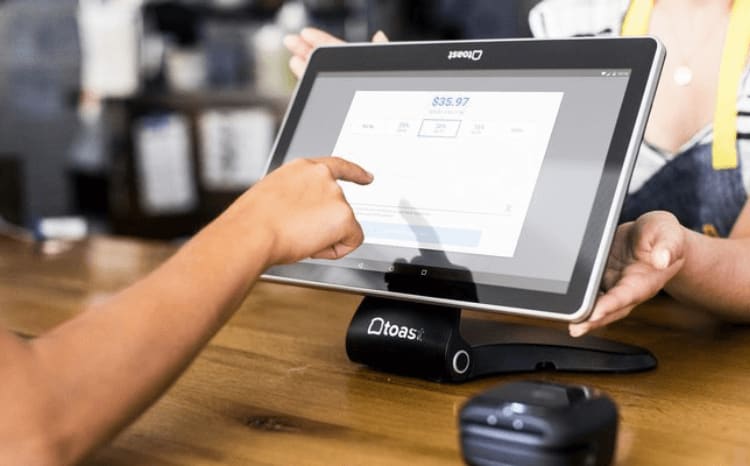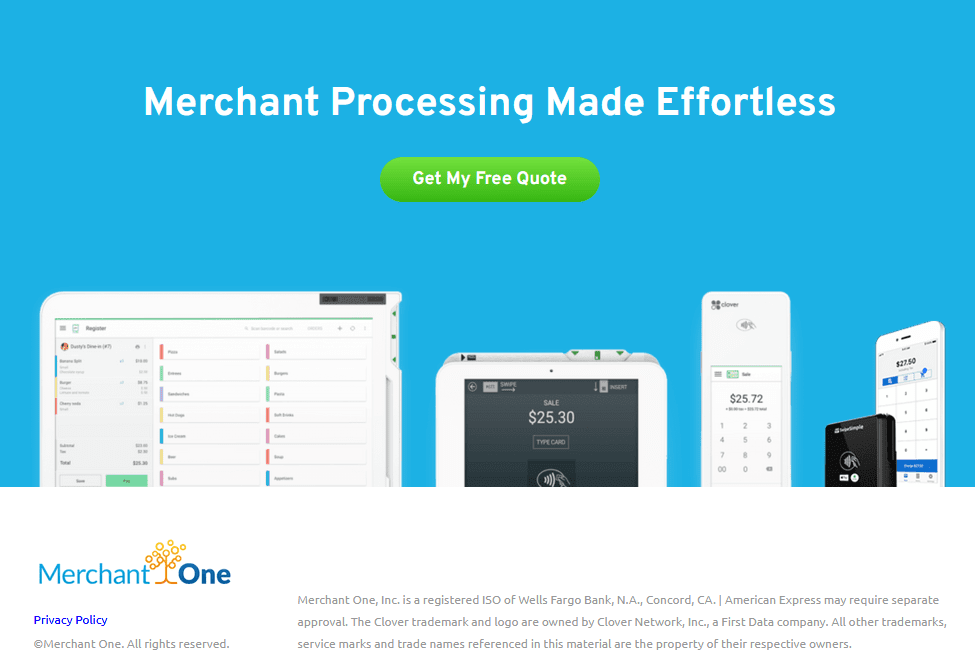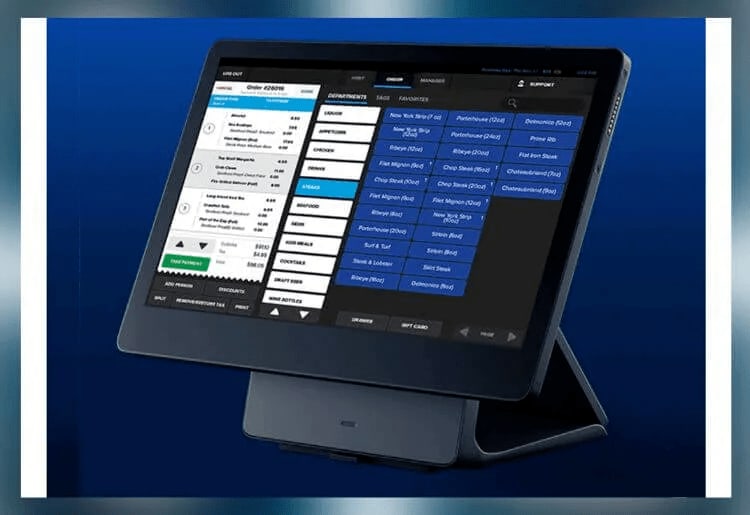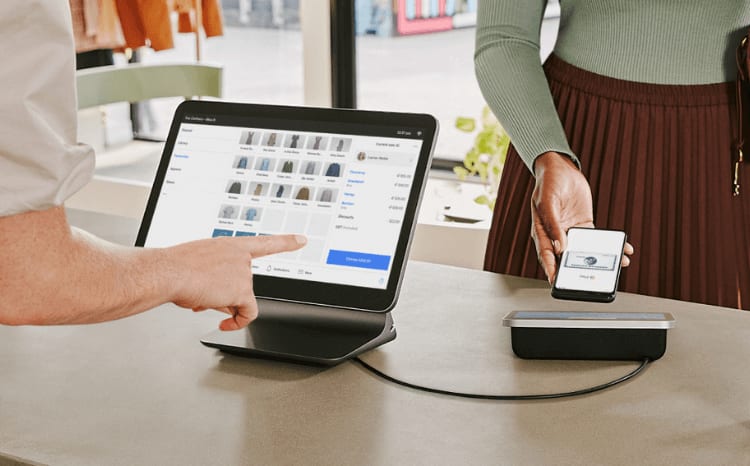Types of POS Software
There are 4 main types of POS software:
Mobile POS software
This software is cloud-based and comes as an app on your smartphone or tablet. It’s usually compatible with a receipt printer and a credit card swiper, but not as powerful as a full terminal POS system. It’s ideal for sole traders such as plumbers or mobile food cart owners.
Tablet POS software
The tablet version is similar to mobile POS software, but offers more features and capabilities. You could use tablet POS software to manage a large and complex retail businesses with multiple locations, including inventory tracking, employee time tracking, payroll, and accounting. They are compatible with many POS hardware solutions to form a complete POS system for any situation.
Terminal POS software
This is a fixed POS software with full back-office capabilities. It can be cloud-based or on-premise. Terminal POS software is best suited to large retail or online stores, spas, malls, and other brick and mortar businesses.
Self-service or unattended POS software
This is designed to be used in kiosks and outdoor units where it's not practical to post an employee. It is often integrated with another POS system nearby, like to provide an extra sales point in busy grocery stores, coffee shops, or food trucks. It can be cloud-based or on-premise since it's not used with a mobile system.
You’ll also find POS software designed for the unique needs of specific industries, such as restaurant and hospitality businesses, apparel retail, financial services, academia and education, and pharmaceuticals POS software.
The costs of your POS software will vary depending on the type of software you choose. Mobile POS software, such as a smartphone app, can begin at $50 per month, while more complex software can reach several hundred dollars monthly. When you buy POS software, you’ll usually need to pay an upfront purchase price, plus an ongoing monthly or yearly payment processing fees.
Other factors that may affect the cost of your POS software plans include:
- How many features you add
- Any hardware included
- Number of integrations
- Your operating system
POS Systems Costs
Point of Sale systems vary greatly in price depending on the type and size of business you’re looking to equip. There are two costs to consider when looking for a POS system: monthly software fees and an installation fee.
Monthly software costs go anywhere from $0 to $100+ a month. Most paid POS programs will cost you between $15 and $30/month. Installation fees usually include software installation, as well as the hardware itself. Paid POS systems don’t always have user caps, meaning that an unlimited number of workers can use the program to make transactions.
There are, of course, “free” POS systems. This means that the hardware and monthly plans start at $0 but they charge businesses per transition. For example, a POS provider can charge anywhere from 2 to 4% plus a few cents per card-based transactions or manual keyed-in sales.
Getting the Right POS Hardware
POS hardware is the indispensable other half of your POS system. You’ll need to get the right hardware to match the actions and transactions you want to carry out using your POS system. A basic set of POS hardware consists of:
- Printer to offer hard copies of receipts (retail stores, restaurants, and other brick and mortar businesses are likely to need this)
- A POS terminal, or iPad or Android tablet to run your POS software
- Credit card reader
- A cash register to keep cash transactions secure and logged into your system
Depending on your business, you might also need:
- Extra tablets so wait staff can process payments at the table in restaurants
- A router to strengthen your internet for cloud-based POS systems
- A local server to host your on-premise POS software
- Weight scales for food retailers
- Barcode scanners
- Networking cables to connect all of your hardware
- An extra kitchen printer
- Self-serve checkout kiosks
The Benefits of a POS System for Your Business
With a POS system, your business can retain more customers through a better, targeted loyalty program and you can also track inventory so that you never run out of stock unexpectedly. A POS system can help you run complex discount offers when appropriate.
With the right POS system, you can also analyze sales history to discover seasonal buying trends and correlations, which can come in useful when you want to increase sales. You can also remove manual error by using barcode scanners and automatic synchronization, as well as combat absenteeism with a more reliable employee tracking system.
Other major benefits include improving payment security as well as the ability to make more sales thanks to your ability to accept payments across the market.
Cloud-Based vs. On-Premise POS Systems
A cloud-based POS system stores data on remote servers and can be accessed online, whereas a traditional or on-premise POS system stores data on a local server and can be accessed through an internal network. Here’s a breakdown of the main differences between a cloud-based POS and an on-premise POS:
If you have long-term business plans and if your requirements are likely to continue to evolve as your business grows, then a cloud-based POS system is probably the best choice for you. On the other hand, if you have fixed needs or a small budget, you might be best served by choosing a traditional POS system.
How to Choose a POS System Provider
Choosing a POS system provider depends on what kind of business you’re running, how long you’ve been operating, and the scale of your operation. Finding the perfect system provider, though, takes some more research.
Here are some questions, organized by category, that can help you choose the right POS system provider:
Hardware and Features
What features do I need?
What devices are needed to process payments?
What hardware do I need? If you need a lot of items, a provider that bundles hardware options together with the software is a better bet, but if you're going to be using your existing iPad, you’ll need something different.
What kind of receipts are generated?
POS Setup
Does the POS system integrate well with my existing business apps?
Is it easy to set up and use? If it’s more complex, does it offer training?
How good is customer service?
Costs
Do I want to save money upfront or keep my monthly costs down?
How does payment processing work? What kind of hardware is offered by the POS company? Some POS companies offer technology unique to the brand, while others simply offer iPad rentals.
Is the pricing plan transparent?
Are the payment processes cloud-based or more suitable for in-person transactions?
Scalability
What analytics does it offer and what metrics can it check? Make sure that the ones that are most important to you are included in the package.
Does this POS system provide assistance for inventory management? If yes, it’s valuable to see whether there is help with product visibility, inventory, purchasing and replenishing, storage, analyzing inventory and orders, or multichannel tracking.
Does this POS system have integrations for eCommerce, email marketing, or social media? A POS system can provide real time information to better customer experience.
Is it simple to scale up as your business grows?
Seal the Deal with the Ideal POS Solution
Finding the perfect POS system can be a game-changer for your business. Businesses across the board are catching on to the power of these systems. In fact, 86% of restaurants use POS data to make decisions about discounts, loyalty programs, and marketing campaigns. Whether you're looking for a POS for small businesses or managing a larger operation, there's a system out there that fits your needs and budget.
Top contenders like Toast, Lightspeed, and Square each offer unique strengths—from restaurant-specific features to multi-industry versatility and small-business simplicity.
As you evaluate options, consider how each system aligns with your specific needs, whether it's robust inventory tracking, seamless payments, or powerful analytics. Ultimately, investing in the ideal POS is an investment in your company's efficiency, growth, and long-term success.
A point of sale system is where you can ring up customers, receive payment for transactions, and make taxes payable. Point of sale systems are usually made up of special software to collect payment and customer information, as well as hardware to use in physical location. There are also point of sale systems that exist via cloud technology.
There are tons of businesses that use POS systems. You can find point of sale technology at retail businesses like clothing or electronics stores, restaurants, consumer services like beauty salons or spas, the hospitality industry (coffee shops, drivers, travel agencies, hotels), and more.
Your business needs a POS system when you notice that business is growing rapidly and you need help to track your inventory, customer activity, create in-depth reports, and accept payments quicker and with more ease. As your business grows and attracts more customers, a POS system will help reduce mistakes, save you time, and make your operations more organized.
POS systems can be either free or paid. When you sign up for a paid POS system, expect to pay anywhere from $15 to $100+ per month for monthly software fees. Some brands also require an up-front, one-time fee for hardware and installation. Free POS systems usually require minimal hardware fees and instead of monthly payments, they charge per transaction.
Payment processors transfer payments from one account to another, serving as the communicator between the merchant and customer. POS systems do this and much more; point of sale systems use both software and hardware to not only collect payments but also settle taxes paid by merchants for transactions, create receipts, track activity, and more.
Point of sale subscriptions usually come with a few different pieces of hardware like card readers, monitors, receipt printers, cash drawers, barcode scanners, and more. Many POS sale companies also let you use your own iPads and simply integrate their software into the existing technology.
Toast has been rated the #1 POS for iPads on the iOS app store and earned plenty of positive reviews for its flexibility, features, and prices.
Simply put, a good POS system is one that can accommodate your business' needs. It should be scalable, able to accommodate the size and diversity of products or services your business offers, and should have strong customer service support.
LightSpeed is a favorite POS system for retail businesses. It offers a solid eCommerce platform as well as hardware options such as scanners and electronic cash drawers that are particularly useful for retailers.
